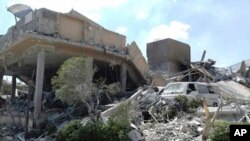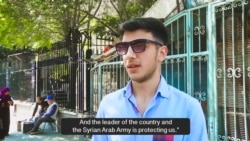Reaction to Saturday's U.S-led strikes on Syrian chemical facilities has been mixed from inside Syria, with some residents applauding the action and others deeming it a show of force to other regional players involved in the conflict.
Tim Al Siofi, an activist and journalist who survived a recent chemical attack in Douma and left the city last week with the last convoy to Idlib, told VOA that Syrians have stopped trusting the international community.
“I got out from Douma after the last chemical attack and until today I am suffering from the effects of inhaling the poisonous gas. After the chemical attack, I buried my best friend in the garden of my house. The last victims were buried in schools and even dumpsters because there was not enough space in cemeteries,” Al Siofi said.
“The international community was never sincere with Syrians,” he added.
The Syrian government has denied there was a chemical attack, a view also held by some regime supporters.
Al Siofi said the world is still missing the more important issue: That civilians are dying at an alarming rate in Syria because of non-chemical weapons.
“More than 2,500 people have been killed in the last two months in Eastern Ghouta with all kinds of weapons, and no one did anything about it. It is like telling the regime that all weapons are allowed to be used against civilians except chemical weapons,” Al Siofi said.
Jawad Abu Hamzah, a journalist working with Al Jazeera in Nawa area in southern Syria, echoes Al Siofi’s criticism.
“Some Syrians prefer to die in chemical weapons [attacks] because they will not be blown to pieces by barrel bombs or a missiles,” Hamzah said. “We do not trust the international community anymore, nor the Arab countries or the so-called friends of Syria. Syrians today feel that the world have let them down, and this is why Assad used chemical weapons against Syrians because no one will help the people.”
“The U.S. strike is not effective. They are empty threats. They only seek to send a message and would not stop Assad. This will not deter Assad, now he feels victorious,” he added.
Some Syrians demand that the U.S. should take more measures against the regime and hit Assad's government where it hurts.
“From what we learned, the regime endured minimum losses despite the Pentagon’s statements that these are stronger attacks compared to the ones that took place a year ago,” Ahmed Al Jarba, an Idlib based activist told VOA.
“We were hoping that these strikes would target Syrian regime’s active military positions. We do not want the strike to be a response to the use of chemical weapons,” he added.
Narrow military objective
Some like Barzan Iso, a Kurdish analyst based in northeastern Syria, believe the strikes were part of a calculated and narrow military mission and they should be viewed in their proper context.
“The strikes are aimed at deterring the regime from using internationally prohibited weapons. The goal is to deter and to alter the balance of power in Syria,” Iso said. “This is clear from striking research centers and a couple of airports. As UK Prime Minister Theresa May said, the goal is not a regime change, but to prevent the use of chemical weapons and stop them from being normalized.”
But Abdullah Abdul Karim, the manager of Al Badia24 News, covering central and eastern Syria, believes even the limited military mission did not achieve what it could have achieved.
“We know that the Syrian regime emptied all the targeted locations before the strikes and the damages were only in the form of materials. I think these strikes are aimed at sending a message to other actors on the ground not to attack the U.S. forces in eastern Syria or threaten them,” Karim said.
Walaa Ahmad, founder and manager of the Idlib-based Release Me Foundation, a nonprofit advocacy group working for the rights of women detainees in Syria, believes the strikes were symbolic.
“I don’t think that this is an effective strike because it does not hinder the regime’s abilities nor does it limit Syrian regime’s chemical weapons abilities. This is a symbolic strike to send a message and that it would not to deter the regime,” she said.
U.S military officials, however, charge the strikes were effective.
“We've attacked the heart of the Syrian chemical weapons program," Lt. Gen. Kenneth McKenzie, Director of Joint Staff, told Pentagon reporters Saturday. "This has dealt them a very serious blow.”
WATCH: Pro-Government Syrians Say Chemical Attacks Fabricated by West
Regime supporters
There are some Syrians who think the chemical weapons attack never occurred.
"What they're saying, that there were chemical weapons or not chemical weapons, we welcome the delegation, to come and see," Mohamed Fayez, a Damascus resident, told AP.
The Organization for the Prohibition of Chemical Weapons (OPCW) said Friday that a team of investigators was on its way to Syria to investigate the chemical attack.
Surely, 100 percent, they'll not find anything,” Fayez said.
But activist Al Siofi believes the investigation will not be able to prove the attack happened because the regime will get rid of any trace of chemical weapon use.
“Now all the areas attacked by chemical weapons are in the hands of the regime and so evidence could be destroyed,” he said.
Some information in this report came from The Associated Press. VOA National Security Correspondent Jeff Seldin and Rikar Hussein contributed to this report.






